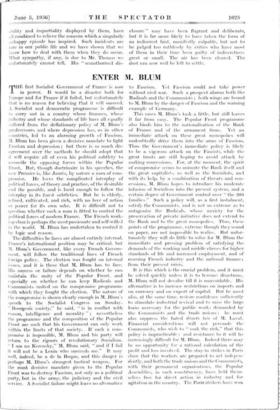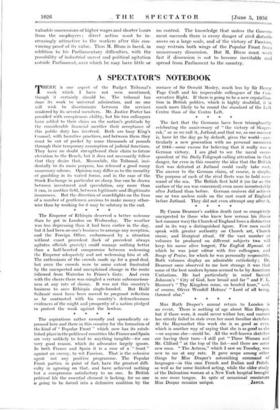ENTER M. BLUM
THE first Socialist Government of France is now in power. It would be a disaster both for Europe and for France if it failed, but unfortunately that is no reason for believing that it will succeed. A Socialist and democratic programme is difficult to carry out in a country whose finances, whose industry and whose standards of life have all equally suffered. from the deflationary policy of M. Blum's predecessors, and where depression has, as in other countries, led to an alarming growth of Fascism. M. Blinn has been given a decisive mandate to fight Fascism and depression ; but there is so much dis- agreement over the methods he should adopt that it will require all of even his political subtlety to reconcile the opposing forces within the Popular Front. But, though doctrinaire in his speeches, the new Premier is, like Jaures, by nature a man of com- promise. He loves the complicated interplay of political forces, of theory and practice, of the desirable and the possible, and is lucid enough to follow the interplay in its finest subtleties. But he is elderly, refined, cultivated, and rich, with no love of action or power for its own sake. It is difficult not to question whether such a man is fitted to control the political forces of modern France. The French work- ing-class is perhaps the most passionate and self-willed in the World. M. Blum has undertaken to control it by logic and reason.
The difficulties he faces are almost entirely internal. France's international position may be critical, but M. Blum's Government, like every French Govern- ment, will follow the traditional lines of French foreign policy. The election was fought on internal issues, and it is these that M. Blum has to face. His success or failure depends on whether he can maintain the unity of the Popular Front, and especially on whether he can keep Radicals and Communists united on the compromise programme with which they fought the election. The nature of the compromise is shown clearly enough in M. Blum's speech. to the Socialist Congress on Sunday. "Bourgeois society," he said, " is in conflict with reason, intelligence and morality " ; nevertheless the programme and the composition of the Popular Front are such that his Government can only work within the limits of that society.. If such a com- promise is impossible, M. Blum and his party will return, to the rigours of revolutionary Socialism. "I am no Kerensky,". M. Blum said, "and if I fail it will not be a Lenin who succeeds me." It may well, indeed, be a de la Roque, and this ,danger is perhaps M. Blum's strongest tactical weapon. For the most decisive mandate given to the Popular Front Was to destroy Fascism, not only as a political party, but in the army, the judiciary and the civil service. A Socialist failure might leave no alternative to Fascism. Yet Fascism could not take power without civil war. Such a prospect alarms both the Radicals and the Communists ; both wings are bound to M. Blum by the danger of Fascism and the warning example of Germany.
This eases M. Blum's task a little, but still leaves it far from easy. The Popular Front programme also binds him to the nationalisation of the Bank of France and of the armament firms. Yet an immediate attack on these great monopolies will undoubtedly drive them into the arms of Fascism. Thus the Government's immediate policy is likely to be a vigorous attack on the Fascists, while the great trusts are still hoping to avoid attack by making concessions. For, at the moment, the spirit of compromise seems to animate the Bank itself and the great capitalists, as well as the Socialists, and with its help, by a combination of threats and con- cessions, M. Blum hopes to introduce his moderate infusion of Socialism into the present system, and a certain degree of Government control over "the 200 families." Such a policy will, as a first instalment, satisfy the Communists, and is not so extreme as to antagonise the Radicals, whose anxiety for the preservation of private initiative does not extend to the Bank and to the great monopolies. Thus, these points of the programme, extreme thought they sound on paper, are not impossible to realise. But unfor- tunately they will do little to solve for M. Blum the immediate and pressing problem of satisfying the demands of the working and middle classes for higher standards of life and increased employment, and of rescuing French industry and the national finances from their present crisis.
It is this which is the crucial problem, and it must be solved quickly unless it is to become disastrous. M. Blum will not devalue till it is unavoidable. His alternative is to increase restrictions on imports and on currency and on export of capital. But he must also, at the same time, restore confidence sufficiently to stimulate industrial revival and to raise the large loans necessary for the public work; demanded by the Communists and the trade unions : he must also suppress the hated decrets lois of M. Laval. Financial considerations will not persuade the Communists, who wish to "soak the rich," that this policy is impracticable ; and resistance to it will be increasingly difficult for M. Blum. Indeed there may be no opportunity for a rational calculation of the profit and loss involved. The stay-in strikes in Paris show that the workers are prepared to act indepen- dently, and both the trade unions and the Communists, with their permanent organisations, the Popular Assemblies, in each constituency, have held them- selves free for direct action in industry and for agitation in the country. The Paris strikers have won valuable concessions of higher wages and shorter hours from the employers ; direct action must be in- creasingly attractive to the workers after this con- vincing proof of its value. Thus M. Blum is faced, in addition to his Parliamentary difficulties, with the possibility of industrial unrest and political agitation outside Parliament, over which he may have little or no control. The knowledge that unless the Govern-- ment succeeds there is every danger of civil disturb- ances on a large scale, and of the victory of Fascism, may restrain both wings of the Popular Front from unnecessary dissension. But M. Blum must work fast if dissension is not to become inevitable and spread from Parliament to the country.















































 Previous page
Previous page